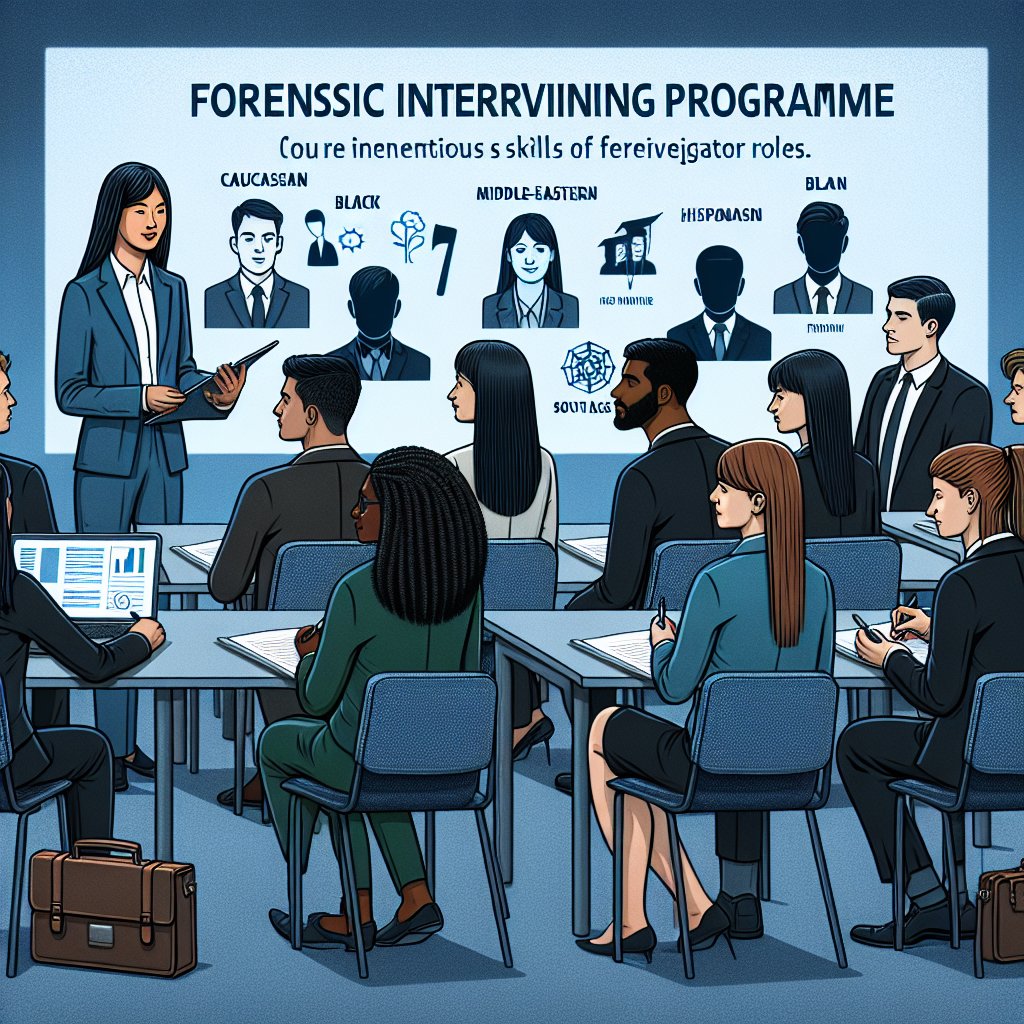
Introduction
In a world where justice often hinges on the details of human experience, the art of forensic interviewing stands as a critical component for investigators. Every conversation can reveal layers beneath the surface, and the ability to extract accurate information from individuals during high-stress situations is not merely beneficial; it is essential. This comprehensive guide on Forensic Interviewing Training: Essential Skills for Investigators will delve into the techniques and psychological frameworks that can enhance an investigator’s capabilities, leading to more successful outcomes in criminal cases.
Understanding the Importance of Forensic Interviewing
Forensic interviewing is not just about asking questions; it’s an intricate dance of communication, observation, and deduction. To illustrate its vital role, we can look at the high-profile case of Amanda Knox, who faced a lengthy ordeal involving complex interviews by law enforcement. The way she was questioned significantly impacted public perception. Effective forensic interviewing practices could have led to clearer answers and a more straightforward resolution.
The Foundation of Forensic Interviewing
Key Components
The most essential skills for investigators can be categorized into several foundational components:
- Preparation and Planning: Understanding the case, the subject, and the context before the interview.
- Building Rapport: Establishing a connection to increase the likelihood of obtaining truthful responses.
- Active Listening: Being attuned to verbal and non-verbal cues.
- Effective Questioning: Crafting questions that encourage detailed responses without leading the interviewee.
- Note-taking and Documentation: Keeping accurate records for future reference and case integrity.
Table 1: Essential Skills Breakdown
| Skill | Description |
|---|---|
| Preparation | Define objectives and gather background information. |
| Rapport Building | Create a safe space for the interviewee to share truthfully. |
| Active Listening | Focus not just on words, but on body language and tone. |
| Questioning Techniques | Formulate open-ended questions that promote dialogue. |
| Documentation | Record statements verbatim to maintain accuracy and integrity. |
The Psychological Aspect of Interviewing
Understanding Behavioral Cues
Investigators need to be adept at recognizing behavioral cues that might indicate deception or truthfulness. Researchers have found that non-verbal signals can often provide more profound insights than spoken words. Training in this area is crucial, as misinterpretation can lead investigators astray.
Interesting Fact: A study by the University of Massachusetts found that 60% of people cannot accurately detect lies, making effective interviewing even more critical.
Case Study: The Enron Scandal
During the Enron scandal, investigators faced numerous challenges in extracting confessions and information from involved parties. Through structured forensic interviewing techniques, they were able to uncover the fraud by breaking down the subject’s defenses and encouraging them to share their side of the story. This case underscores the importance of skilled questioning and psychological awareness.
Advanced Interview Techniques
The PEACE Model
One of the most successful models utilized in forensic interviewing is the PEACE model, which stands for:
- Planning and Preparation
- Engage and Explain
- Acquire Information
- Closing the Interview
- Evaluate
By structuring interviews around these elements, investigators can maximize information-gathering while minimizing the potential for misleading responses.
The Role of Technology in Forensic Interviewing
In recent years, technological advancements have transformed the way investigators approach interviews. Tools ranging from recording devices to software that analyzes tone and pitch can provide valuable insights.
| Technology | Application |
|---|---|
| Digital Recording | Ensures accuracy in preserving statements. |
| Analysis Software | Evaluates verbal and non-verbal communication patterns. |
| Transcription Services | Facilitates accurate record-keeping for future reference. |
Challenges in Forensic Interviewing
Despite the benefits of effective forensic interviewing, several challenges persist:
- Cognitive Biases: Investigators must be wary of their own biases that could affect the interview.
- Emotional Barriers: Interviewees may be influenced by stress, fear, or emotional turmoil, making it difficult for them to communicate effectively.
- Legal Constraints: Adhering to legal standards is crucial, as improper techniques can jeopardize a case.
Analysis of Emotional Barriers
The case of Zachary Kouwe, a journalist wrongfully accused, illustrates how emotional barriers can hinder communication. His initial interviews were filled with anxiety and confusion, impacting his ability to provide clear responses. Through properly trained investigators using empathy and patience, a more comprehensive understanding of his narrative was achieved.
Best Practices for Forensic Interviewing
Engaging the Interviewee
One of the commonly overlooked aspects of investigative interviewing is the need to engage the interviewee effectively. Techniques such as:
- Using Open-Ended Questions: Encourage the interviewee to share their experiences in their own words.
- Active Empathy: Showing understanding and validation can often lead to more honest dialogue.
The Value of Training Programs
Training programs focused on Forensic Interviewing Training: Essential Skills for Investigators can sharpen these skills. Such programs often include mock interviews and practical exercises, enabling investigators to practice and refine their techniques.
Case Study: The JonBenét Ramsey Investigation
In the investigation of JonBenét Ramsey, forensic interviewing proved critical. Several interviews with family members could have benefitted from enhanced training, as initial interviews lacked structure and led to conflicting narratives. This highlights the need for consistent training across all levels of investigation to ensure accuracy and integrity.
Conclusion: Empowering Investigators
The landscape of forensic interviewing is continually evolving. By equipping investigators with Forensic Interviewing Training: Essential Skills for Investigators, we empower them to not only extract essential information but also contribute to a fair justice system. As the field progresses, embracing advanced methodologies and understanding human behavior’s intricacies will only become more vital.
FAQs
1. What is forensic interviewing?
Forensic interviewing is a specialized technique used by investigators to gather accurate information from individuals involved in legal matters, focusing on techniques that encourage truthful responses.
2. How is forensic interviewing different from regular interviewing?
Forensic interviewing requires a deeper understanding of psychological principles and advanced questioning techniques to elicit testimonies in a legally sound manner.
3. What training is available for forensic interviewing?
Many organizations offer specialized training programs, workshops, and certifications focused on the skills needed for effective forensic interviewing.
4. How can I improve my interviewing skills?
Engage in professional training programs, practice active listening, and receive feedback from experienced colleagues to refine your techniques.
5. Are there any certifications for forensic interviewing?
Yes, various certifications are offered by recognized institutions that provide comprehensive training in forensic interviewing methodologies.
By mastering these essential skills, investigators can dramatically improve their interviewing efficacy, ultimately serving justice and the truth more effectively.















